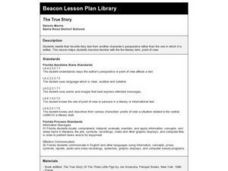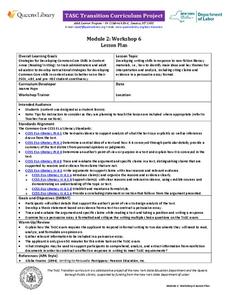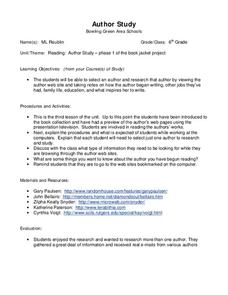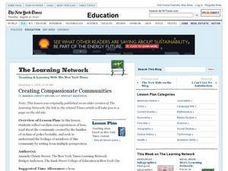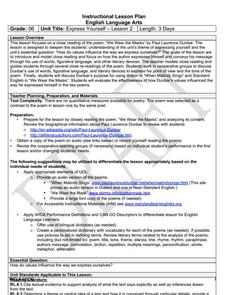Curated OER
The True Story
What's your favorite fairy tale? Seventh graders rewrite their favorite fairy tale from another character's perspective rather than the one in which it is written. This instructional activity helps readers become familiar with the...
Syracuse City School District
Literary Elements
Address the literary elements in a piece of writing using these materials. The packet includes plenty of resources, and focuses mainly on theme, character, and point of view, with some materials for setting, symbolism, and author's...
Curated OER
Prose Styles: Tough, Sweet, and Stuffy
Take a walk on the rhetorical side with this presentation, which discusses three styles of prose: tough (ethos), sweet (pathos), and stuffy (logos). The slide show provides thorough definitions and examples of each style, as well as...
Prestwick House
The House on Mango Street Activity Pack
Enrich a unit on The House on Mango Street by Sandra Cisneros with a selection of related activities. The packet contains nine activities that go from pre-reading through wrapping up the novel. Young readers work on studying author's...
EdHelper
George Washington's Socks by Elvira Woodruff
A solid, straightforward book report form is an excellent addition to your literature unit. Class members note the main characters, point of view, plot elements, and other important details from a story, adding their favorite part from...
Mr. Mansour
Ralph S. Mouse by Beverly Cleary
Take an in-depth look into Beverly Cleary's story, Ralph S. Mouse, with a 10-question learning exercise that focuses on story elements. Scholars describe the main character, point of view, conflict resolution, and more! Then, conclude...
Museum of Tolerance
Developing Media Literacy
To protect young people from questionable content, many schools limit access. This resource suggests that because learners can so readily avail themselves to unrestricted Internet access, it is vital for 21st century learners to develop...
EngageNY
TASC Transition Curriculum: Workshop 12
How can opinions slant facts? Workshop participants learn how to examine primary and secondary sources and identify the author's point of view. They also examine how visual art impacts the meaning and rhetoric of sources. Full of...
Deer Valley Unified School District
Close Reading: Analyzing Mood and Tone
The AP Literature and Composition exam is all about close reading. Test takers are presented with a passage and asked to analyze how an author uses literary devices to create a desired effect. Prepare your students for the exam with a...
Curated OER
8th Grade Reading Comprehension Success
Augment your eighth grade language arts curriculum with a thorough set of reading comprehension activities and assessments. Focusing on a variety of skills, including vocabulary in context, text structure, main idea, and author's style,...
Academy of American Poets
Teaching the Vietnam War with Poetry and Archives
The language of and the perspective of photographs, poems, and official reports differ. After a close reading of two photographs, two poems, and a military report about the Vietnam War, individuals adopt someone's voice or something from...
EngageNY
TASC Transition Curriculum: Workshop 6
Is a college education necessary for success in today's world? The class investigates the question, along with others at the end of the sixth workshop in a 15-part series. The lesson plan has four parts with multiple activities and...
Curated OER
Shaping the View: Composition Basics
Students view images from the Metropolitan Museum of Art web site, and list the objects and figures in the image. They discuss the way their eyes move around the canvas and take note of where their eyes fall, follow and finish. Students...
Curated OER
Writing a Children's Book -- Young Authors
Pupils practice their writing skills by creating a children's book. They integrate five elements of short stories into the narrative. They share their stories with their book buddies.
Curated OER
Determining Point of View
Students examine web sites to determine point of view and bias in information sources. They determine the usefulness of information based on these biases or limitations.
Curated OER
Author Study
Sixth graders complete a research paper on an author of their choice. After selecting an author of interest, 6th graders use internet and traditional resources to gather information from at various sources. They use their information to...
Curated OER
Who Fought for the Union?
Learners read New York Times articles, letters, and listen to songs written from a soldier's perspective during the Civil War in order to understand who was fighting in the Union Army. This is a great lesson, complete with weblinks,...
Nancy N. Boyles
Summary Frame for Story Text and Informational Text
Provide these templates as aids for pupils as they work to compose summaries of both stories and informational texts. The first two frames provide sentence starters to help learners structure their summaries and include all the necessary...
North Carolina Consortium for Middle East Studies
The French and Indian War: The War That Shaped America’s Destiny
How would a Frenchman, Englishman, and Native American have each viewed the French and Indian War? Your young historians will learn about their unique perspectives and the war as a whole through a role-playing activity, engaging...
Fluence Learning
Writing About Informational Text: Beyond the Beyond—Galaxies
Everyone has a different point of view, even when it comes to the enormity of the universe. Two separate text passages explain the scope of a galaxy, prompting young readers to write an essay about each author's argument and how the...
Curated OER
I'm a Changed Pig - Personal Narrative
Young writers explore character arcs, conflict, and narrative in this complete and ready-to-use lesson plan from Scholastic. As a class read The Three Little Wolves and the Big Bad Pig and discuss the dramatic change the pig undergoes...
Curated OER
Historical Agency in History Book Sets (HBS)
Study historical events by combining the study of historical fiction and non-fiction. Learners read about true past events in historical fiction novels and then research non-fiction accounts of the same events. What are some differences...
Curated OER
Creating Compassionate Communities
Have you ever lost someone? Middle and high school learners journal about a time they experienced the loss of someone through death, divorce, moving, or another type of change. They share their responses and discuss an article relating...
Curated OER
6th Grade: Express Yourself, Lesson 2: Close Read
The second lesson plan of a pair about Paul Laurence Dunbar, this plan focuses in particular on his poem, "We Wear the Masks." After a short historical introduction, class members conduct a series or readings, marking up the text and...
Other popular searches
- Authors Point of View
- Author's Point of View
- Author's Point of View Media
- Authors Point of View Media
- Author's "Point of View" Media


